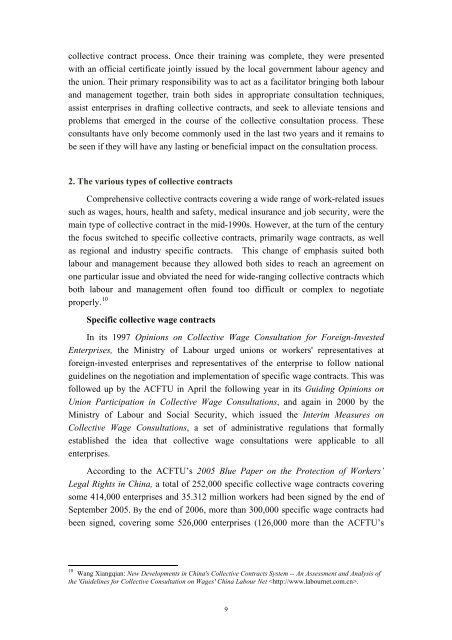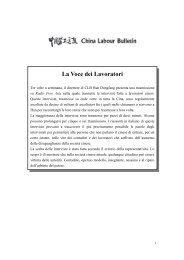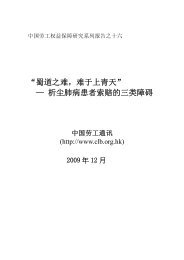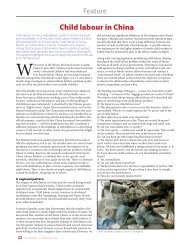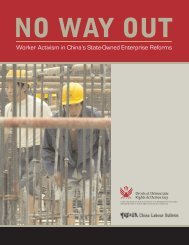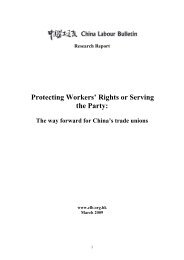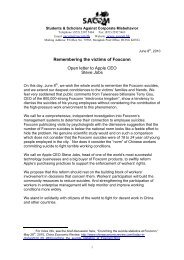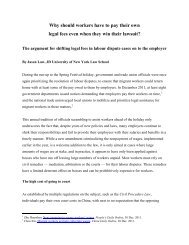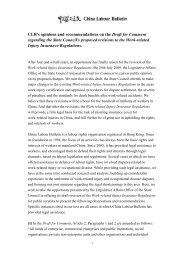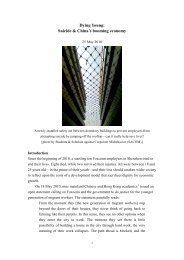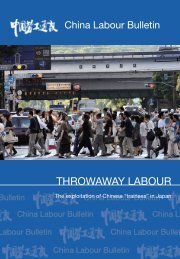here - China Labour Bulletin
here - China Labour Bulletin
here - China Labour Bulletin
Create successful ePaper yourself
Turn your PDF publications into a flip-book with our unique Google optimized e-Paper software.
collective contract process. Once their training was complete, they were presented<br />
with an official certificate jointly issued by the local government labour agency and<br />
the union. Their primary responsibility was to act as a facilitator bringing both labour<br />
and management together, train both sides in appropriate consultation techniques,<br />
assist enterprises in drafting collective contracts, and seek to alleviate tensions and<br />
problems that emerged in the course of the collective consultation process. These<br />
consultants have only become commonly used in the last two years and it remains to<br />
be seen if they will have any lasting or beneficial impact on the consultation process.<br />
2. The various types of collective contracts<br />
Comprehensive collective contracts covering a wide range of work-related issues<br />
such as wages, hours, health and safety, medical insurance and job security, were the<br />
main type of collective contract in the mid-1990s. However, at the turn of the century<br />
the focus switched to specific collective contracts, primarily wage contracts, as well<br />
as regional and industry specific contracts. This change of emphasis suited both<br />
labour and management because they allowed both sides to reach an agreement on<br />
one particular issue and obviated the need for wide-ranging collective contracts which<br />
both labour and management often found too difficult or complex to negotiate<br />
properly. 10<br />
Specific collective wage contracts<br />
In its 1997 Opinions on Collective Wage Consultation for Foreign-Invested<br />
Enterprises, the Ministry of <strong>Labour</strong> urged unions or workers' representatives at<br />
foreign-invested enterprises and representatives of the enterprise to follow national<br />
guidelines on the negotiation and implementation of specific wage contracts. This was<br />
followed up by the ACFTU in April the following year in its Guiding Opinions on<br />
Union Participation in Collective Wage Consultations, and again in 2000 by the<br />
Ministry of <strong>Labour</strong> and Social Security, which issued the Interim Measures on<br />
Collective Wage Consultations, a set of administrative regulations that formally<br />
established the idea that collective wage consultations were applicable to all<br />
enterprises.<br />
According to the ACFTU’s 2005 Blue Paper on the Protection of Workers’<br />
Legal Rights in <strong>China</strong>, a total of 252,000 specific collective wage contracts covering<br />
some 414,000 enterprises and 35.312 million workers had been signed by the end of<br />
September 2005. By the end of 2006, more than 300,000 specific wage contracts had<br />
been signed, covering some 526,000 enterprises (126,000 more than the ACFTU’s<br />
10 Wang Xiangqian: New Developments in <strong>China</strong>'s Collective Contracts System -- An Assessment and Analysis of<br />
the 'Guidelines for Collective Consultation on Wages' <strong>China</strong> <strong>Labour</strong> Net .<br />
9


